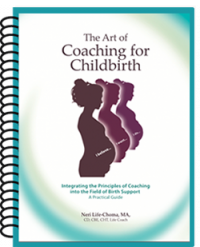
Hey Doula, Can You Handle My Husband?
Were you ever hired by an expectant mom to “handle her husband”?
In my sixteen years of practice, I have had a few clients who hired me in order to do just that – handle their husbands. There could be various different explanations that come along with this request, such as: “I do not want him in the room at all, but I don’t want to hurt his feelings, so please make sure he is busy, give him tasks” or “My husband is taking over any situation, I can’t have him take over my birth”, as well as “He thinks he can take it, but I know him, he can’t, so I need you to be his doula and keep him calm”.
Coincidentally enough, my doula students and I have had more than a few encounters with the request to ‘handle husbands’ lately, and I believe many other doulas might have too. Couples’ dynamics can be challenging in childbirth; it can challenge our support efforts and can have an impact on couples’ satisfaction level with their experience and our service.
Doulas can be ready for the challenge and reduce its impact on their support when they are trained with the right conversational coaching strategies and address couples’ dynamics prenatally. Childbirth itself is not the right time to learn these dynamics and find the best strategies to help couples navigate the experience as a team. While in labor, you want this couple to perform at the peak of their ability and get along as an excellent team.
From a coaching perspective, doulas are in the business of group coaching. If it is more than one, it’s a group!
From a coaching perspective, doulas are in the business of group coaching. If it is more than one, it is a group, and a couple is definitely a group. Doulas are trained to focus on the birth givers’ needs, feelings, and physical comfort. Nevertheless, we cannot ignore the birth partners, nor can we team up with the birth giver and “handle’ the partner in a way that suits the birth giver. It is unhealthy for us and it’s harming our clients’ relationships.
If sounds like manipulation, it’s a red flag!
For the purpose of handing doulas the coaching tools for dealing with this challenge, I want to share an actual case study, with the permission of my doula student. A couple of months ago my student met with her second client, and was asked by the mother to “watch” him during labor and redirect him, “take him away” if he gets to be too much in my way.” (This is taken directly from the student’s notes). My student agreed to her client’s request, believing that she was doing her good, and here is what she wrote in her supervision report: “When faced with this request, I suggested to [mom] that we come up with a secret sign that would let me know to redirect [dad]”.
During our supervision session, following her meeting with the client, I asked her how she thought this agreement served the mother. I pointed out to her that from a coaching perspective, our role is to empower the mother to express herself, her wishes, and needs, to her support group. If we do this for her, we are depriving her of opportunities to grow. Doulas sometimes feel the need to rescue the mother but only because we don’t perceive our clients as competent adults. Now how empowering is this approach? One of the basic principles of empowerment is to trust the client. Believe in her. Transformational Birth Support Coaches empower birth givers to express their beliefs, needs, and goals and share them with everyone involved – partners and medical caregivers. In fact, if you work with a client who has a hard time expressing her needs to her partner, you may assume that it will be ten times harder for her to share them with the caregiver. You can encourage them to begin with the birth partner as a practice that will build the capacity to do it with their care providers.
Vocalizing their beliefs, needs, and goals with their birth partners is a great practice leading to expressing one’s truth and needs with one’s medical caregivers
In her following meeting with the client, my student never went back to revise her client’s request to “handle the dad”. After the birth, she texted me: “I had the feeling that my client did not want me there at all, did not want me at the birth”. As her trainer, I was concerned about that and asked her to try and explain the source of her feeling. Here is what came up: “Surprisingly the dad did a very good job supporting his wife during labor, and she seemed happy with what he was doing. I was more in the background suggesting and preparing things for them. She never talked to me directly or engaged with me.”
From my perspective, the doula failed to serve the clients because she never clarified her client’s request or the motivation and beliefs the client had around this request. The doula could have asked clarifying questions such as:
- Can you give me some examples of what you mean by “Gets to be too much in my way”?
- How does it look like when he is in your way?
- How does it make you feel when he is in your way?
- How do you react when he is in your way?
- How do you suggest that I redirect him?
- And the $1M question that could have evoked a change in the couple’s relationships: Would you like us to practice some ways for you to express how you feel and what you need from him?
It is not your role to provide couples’ therapy, but you can coach them gently and facilitate joined agreements in specific areas relating to the nearing birth
Instead, the doula felt that the partner did well. My poor student did not hear from this couple again, although she tried to reach out to them and facilitate closure. It was an unsuccessful experience for both the birth giver and the doula that ended p in a cesarean.
As a doula, I encourage you to pay attention to explicit and/or implicit signals that you get about the couple’s dynamics. If there are issues with their dynamics, don’t ignore them, as they will almost certainly emerge during the birth and can sabotage your efforts to help the couple achieve the positive experience they desire. It is not your role to facilitate a change in couples’ relationships; you are not a therapist. But you can coach them gently and facilitate specific agreements for the sake of healthy and positive childbirthImagine how valuable it would be for them to communicate in a respectful manner, to establish teamwork, to work out their differences, or to express their needs to one another during childbirth. This experience will leave its mark on their relationship and will empower them to create the change needed.
Here are some tools for coaching the couple around their dynamics:
- Reflect on the explicit and/or implied message that has alerted you with questions like: ” Did I understand correctly that you are …”
- If your impression is confirmed, ask for examples and clarifications until you are clear on the matter. “Can you give me some examples?”, “How does it looks like?” Or “How do you feel when…?”
- Try to make the couple observe the problem. You may ask: “Do you see any problem with this? “ Or “Can you think of any impact this might have on your birth experience?”
- Explain your position as their birth doula – focus on the fact that your role is to empower and support both of them. Explain what might be the impact of the issue, or how their dynamics might be in the way of achieving the positive birth experience they hired you for.
- When there is agreement about the problem, we can try to facilitate a solution: “What are you guys willing to do about it?” Or “Can you think about a different way to do things for the sake of a positive childbirth experience? “
- Create or look for opportunities for the couple to practice the new communication skill or pattern.
- During childbirth, if there is a need, remind them of their commitment to practice new coupling skills for the sake of their childbirth experience.
Reflecting, asking strong questions, clarifying, practicing new skills, and empowering, all are coaching strategies. I am committed to enriching childbirth pros of all types – doulas, childbirth educators, prenatal yoga teachers, medical caregivers, and others, with the coaching tools and strategies. If reading this blog post inspired you to want to learn how to coach towards a healthy birth, I invite you to enroll in the Birth Support Coaching certification course
- Overshadowing the Transformative Essence of Childbirth with Data - July 10, 2024
- Navigating the Epidural Dilemma - May 28, 2024
- Informed Decision in Birth Support: A Myth of Empowerment? - April 29, 2024


